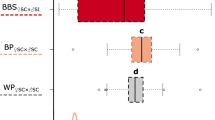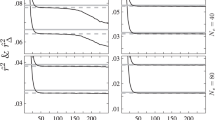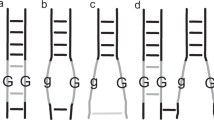Abstract
IN monosomics, two types of gametes having n and (n–1) chromosomes are formed, and the segregation of the three types of plant, 2n (disomic), 2n–1 (monosomic) and 2n–2 (nullisomic), in the progeny of a monosomic is dependent on the frequencies of the n and (n–1) chromosome gametes on the male and female sides. The functional frequencies of n and n–1 male and female gametes can be determined experimentally by making reciprocal crosses between a normal plant and a monosomic. Estimates of the frequencies of n and n–1 gametes on either the male or the female side can be obtained from the observed numbers of disomics, monosomics and nullisomics when the frequencies of gametes on one side are known.
This is a preview of subscription content, access via your institution
Access options
Subscribe to this journal
Receive 51 print issues and online access
$199.00 per year
only $3.90 per issue
Buy this article
- Purchase on Springer Link
- Instant access to full article PDF
Prices may be subject to local taxes which are calculated during checkout
Similar content being viewed by others
References
Bhowal, J. G., Canad. J. Bot., 142, 1321 (1964).
Sears, E. R., Genetics, 29, 232 (1944).
Author information
Authors and Affiliations
Rights and permissions
About this article
Cite this article
BHOWAL, J., CHOUDHURY, A. Estimation of the Frequency of Functioning Gametes in Monosomics. Nature 206, 1067–1068 (1965). https://doi.org/10.1038/2061067b0
Issue Date:
DOI: https://doi.org/10.1038/2061067b0
This article is cited by
Comments
By submitting a comment you agree to abide by our Terms and Community Guidelines. If you find something abusive or that does not comply with our terms or guidelines please flag it as inappropriate.



